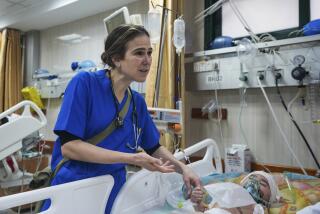Doing Good Doesn’t Always Mean Doing Well : Balkans relief: Much of it is inappropriate or inefficient; instead of bringing child victims here, send medical teams there.
- Share via
In the two weeks since little Irma captured the world’s imagination and brought forth offers of more than 660 hospital bed spaces to other Bosnian children, the major relief agencies have been inundated with private donors offering to pay for the evacuation of these sick and wounded children to the West.
What has been absent from the discussion is whether this is a sound idea.
Think of the cost, in American health-care terms, of airlifting a wounded child to the West and having her spend four weeks at, say, Cedars-Sinai Medical Center--at minimum, a $100,000 proposition. That $100,000 could send six teams, each with 10 especially skilled physicians and nurses, to care for many children. Dozens of such teams are ready to leave right now. And facilities in the region--particularly in Croatia, Slovenia and northern Italy--are more than adequate to care for the majority of child victims of the Balkan conflict.
The medical-teams-to-the-region approach is but one way assistance could be more efficient in the former Yugoslavia. Tons of inappropriate relief supplies are going to the region by air and sea, clogging warehouses and truck routes serving Bosnia. In June, one relief group used half of the space on a cargo airplane to send “pop-tarts” over there (but no toasters). The U.N.-run refugee camp at Karlovac, Croatia, has a dispensary full of outdated, inappropriate pharmaceuticals from England and Germany which its Bosnian volunteer medical staff fears to dispose of in the absence of newer, more appropriate medicines.
Other relief groups have requested that U.S. Air Force planes be used to fly their food shipments to Croatia, a wildly expensive way to do relief work and one that will exhaust the Pentagon’s humanitarian affairs budget.
In the midst of all of the fighting, the blockades and the endless rounds of peace talks that seem to go nowhere, there is a large number of private and international relief efforts ready to be of great help to innocent civilian victims on all three sides of the war. These relief groups have managed to attract unprecedented levels of funding as embarrassed Western governments have put hundreds of millions of dollars--in lieu of military force or liberalized refugee policies--on the table.
Here is what the relief groups--with some unanimity--want done in Bosnia-Herzegovina and Croatia:
* Have the United Nations issue an ultimatum to all sides in the conflict that roadblocks will henceforth be ignored and armed force will be used to clear a path through them for relief supplies.
* Supplies in the aid pipeline should be “triaged,” with the most urgently needed supplies receiving priority transport from Western governments.
* If a peace proposal is accepted, it should clearly establish that relief agencies are free to operate in safety, without harm, threats, demands for bribes or other intimidation.
* Governments’ refugee policies should be clarified and made functional in light of long-standing obligations under a number of international treaties.
Weather conditions will get worse in the Balkans as fall and winter approach; millions more innocents will suffer if the war widens. Aid and diplomacy have to go hand in hand, with the purveyors of each giving due deference to the other. The West has unloaded its responsibility on the United Nations to carry out this function, and the United Nations must do a better job in asserting itself, for everyone’s sake.
More to Read
Sign up for Essential California
The most important California stories and recommendations in your inbox every morning.
You may occasionally receive promotional content from the Los Angeles Times.












